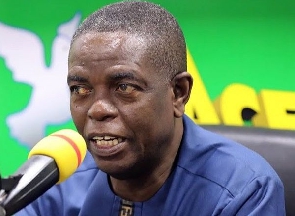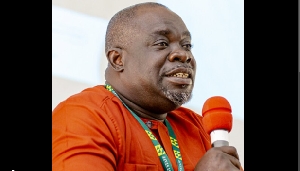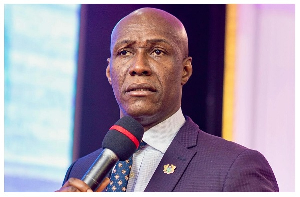A GNA Feature by Francis Ameyibor
Accra, Aug. 30, GNA - Issues of environmental protection, climate change and global warming have in recent times assumed centre stage of discussions in Ghana with various organizations and institutions running workshops and seminars to educate the public on the need to adopt measures to defend Our Earth through healthy environmental practices.
The realisation of the need to protect the environment brings to the fore the importance of the Right to Information (RTI) regime in Ghana to spell out the procedure for having access to environmental information and to strengthen citizens' access to environmental information, Mr Samuel D. E. K. Anku, a Director at the Environmental Protection Agency stated in Accra.
Mr Anku's postulation, which was articulated at a roundtable organized by the Governance Africa Foundation, strengthens the premise that environmental democracy in Ghana could create opportunities for building strong civic constituencies that would support the growth of democracy and reinforce the Rule of Law.
RTI PRE-REQUISITE FOR BUILDING STABLE INVESTMENT ENVIRONMENT
Mr Anku noted: "Integrating RTI in the national decision-making processes is a fundamental pre-requisite for building a stable and predictable environment for investment and business."
In view of this the Ministry of Finance and Economic Planning in its policy direction is treating environmental issues as high priority public sector investment; using sound public finance principles with clear objectives; targets; cost-benefit analysis; performance monitoring and robust audit and compliance procedures to protect the environment.
It's unpardonable that in spite of the fact that the RTI apart from its legal and democratic benefits has direct connection for creating stable investment and business environment, our governments under both the National Democratic Congress - 1993 to 2000 and 2009 to date; and the New Patriotic Party - 2001 to 2008, failed to pass the Bill.
Mr Kwaku Baa-Owusu, Executive Director of Governance Africa Foundation, described the connection between the environment, business and democracy as a matrix, which provided grounds for examination of investment policies; its forms and shapes, and its direct and indirect impact on our environment, economy and governance systems.
The framers of the 1992 Constitution acknowledged RTI as a fundamental human right of all persons in Ghana. "It is only when those who are to participate in governance are well informed that they can contribute meaningfully to governance. This can only be achieved if they have access to the relevant information.
.when citizens are conscious of their rights, they are able to demand for accountability and responsibility on the part of their government".
The primary conceptual foundation for the right of citizens to information is the principle of sovereignty of the people. It is in this regard that the very first Article and Provision of the 1992 Constitution - Article 1 Clause 1 affirms the sovereignty of the people in these immortal words: "The sovereignty of Ghana resides in the people of Ghana in whose name and for whose welfare the powers of government are to be exercised in the manner and within the limits laid down in this Constitution".
RTI is, therefore, an important mechanism for securing social justice, protecting the environment that The Almighty God has freely given to us and mandated us as its custodian.
GHANA UNDER OBLIGATION TO EFFORCE RTI
Ghana in 1992 endorsed the Rio Earth declaration. Principle 10 states: "Environmental issues are best handled with participation of all concerned citizens, at the relevant levels.
"At the national level, each individual shall have appropriate access to information concerning the environment that is held by public authorities, including information on hazardous materials and activities in their communities, and the opportunity to participate in the decision-making process.
"States shall facilitate and encourage public awareness and participation by making information widely available. Effective access to judicial and administrative proceedings, including redress and remedy, shall be provided".
To make possible citizens involvement in environmental decision-making, the above principles highlights three fundamental access rights that empower citizens - access to information, environmental democracy and awareness for seeking redress and remedy.
When these rights are both protected by law and embodied in government practices, decisions are more likely to be equitable and environmentally sustainable and more likely to be fully implemented.
RTI ENFORCES ENVIRONMENTAL DEMOCRACY
Environmental democracy is about government being transparent, accountable and inclusive in making decisions that affect the environment. The term environmental democracy reflects increasing recognition that environmental issues must be addressed by all those affected by the outcome and not just by government and industry.
It captures the principle of equal rights for all those in the environment debate including the public; community groups; advocates; industrial leaders; workers; governments; academics and health care professionals.
For those whose daily lives reflect the quality of their environment, participation in environmental decision-making is as important as in education; health care; finance and government. A complex relationship, therefore, exists between democratic politics and the management of the environment.
The RTI regime from the perspective of environmental experts serve as stronger tool for implementing environmental sustainable strategies; creates new economic opportunities for poor people and also promotes equity and social justice.
Democratic freedoms encourage access to information such as planning documents; budgets; reports on local environmental conditions or pollution records which can help citizens to protect their environmental interest.
LACK OF RTI LIMITS ENVIROMENTAL DEMOCRACY
Mr Anku identified the lack of RTI regime as a major limitation for environmental democracy as the classification of some form of information as "Confidential" on the grounds of national security provides a broad cloak while repressive measures for wrongful disclosure by government officials and the lack of sanctions for failure to provide access do not encourage access to information.
He said the high cost involved in accessing information in government possession; limits effort made to reach a wide range of stakeholders with information including the disadvantaged groups.
In a democratic dispensation, the government is simply an elected and mandated agent, the representative of the people, the citizens are the principals..."it ought to be obvious that any information in the hands of governmental agencies or public bodies is by that very fact information that is held for and on behalf of the people by that government agency or body".
Mr Anku, therefore, urged civil society organizations to work with Government to promote the implementation of the rights of access to information; participation and justice in environmental decision-making through communication; environmental legal education; capacity building and legal assistance for local communities.
OKYEHENE'S OBESSION AND CALCULATED GESTICULATION
In his contribution, Osagyefuo Amoatia Ofori Panin II, Okyehene, said: "I sometimes wonder whether our policy makers care about our environment with their lukewarm attitude towards environmental issues".
Speaking with obsession and calculated gesticulation, Osagyefuo Ofori Panin II said since independence, the country had not experienced any meaningful transformation from the central government "yet we have the audacity to say chiefs don't matter in decision-making of this country.
He said traditional rulers, who modern day saints consider as primitive, instituted measures, norms customs and traditions that protected the environment, water bodies, and the ecosystem.
"But with all our modern education today, we are rather destroying what our ancestors protected and built for us. Activities of illegal miners are destroying our country but the security agencies sit down without concern".
Osagyefuo Ofori Panin II cautioned: "I have done all within my powers to stop illegal mining and chainsaw operation to no avail.they are stubborn because they are not afraid of Okyehene, am going to mobilise my people to defend our land".
He called for proactive environmental protection brigade to defend the lands and natural resources.
With the revelation from environmental experts of an interconnectivity between RTI and the protection of our environment, its now time that the broad spectrum of society, including traditional rulers, environmental non-governmental organisations, academia and the industrial community to join the crusade for the passage of the RTI bill.












